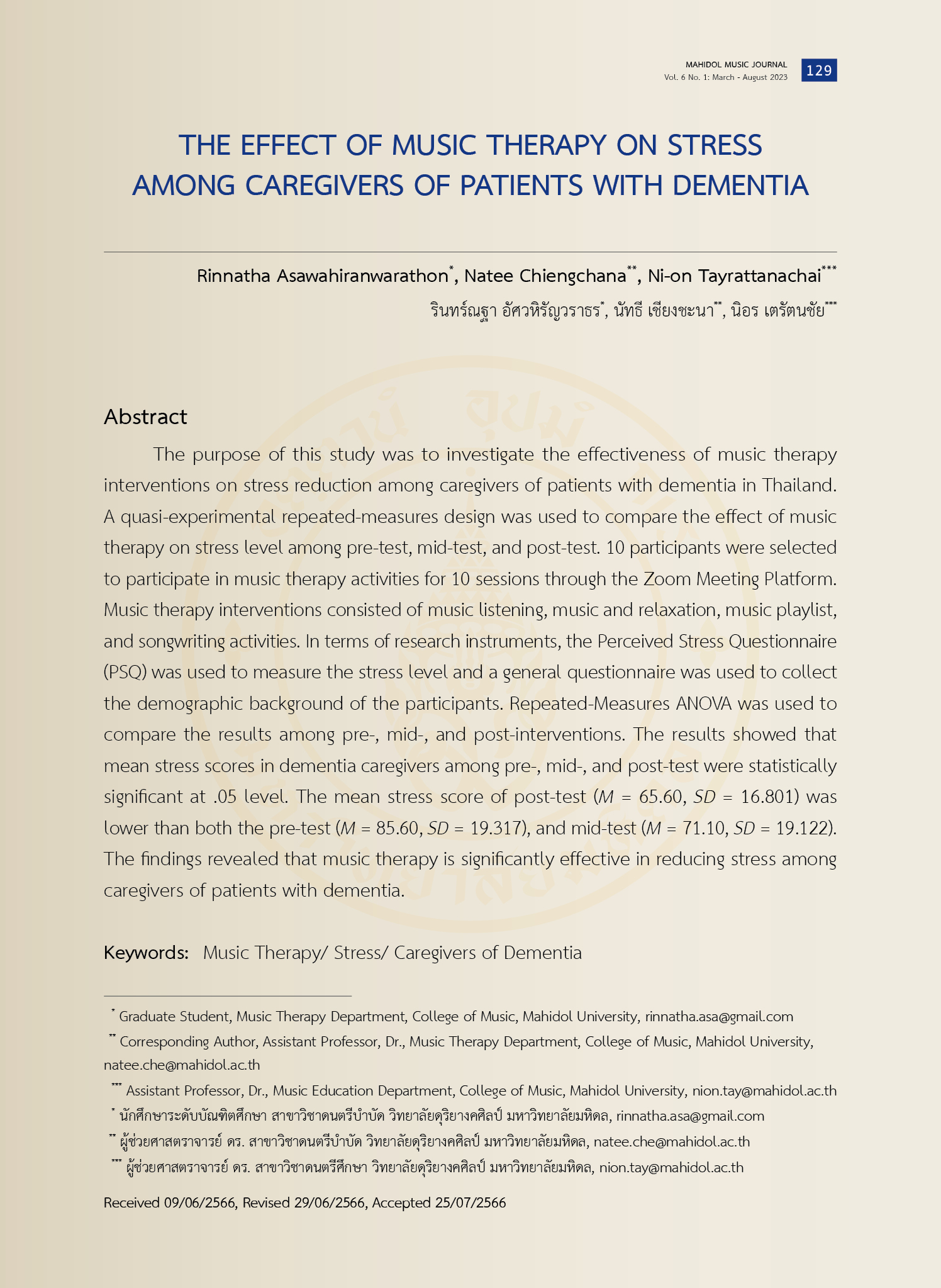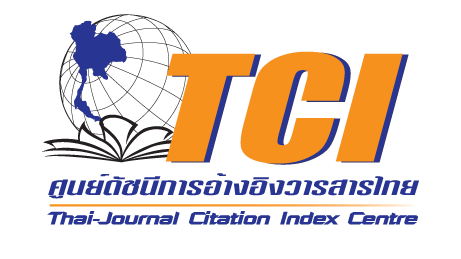THE EFFECT OF MUSIC THERAPY ON STRESS AMONG CAREGIVERS OF PATIENTS WITH DEMENTIA
Keywords:
Music Therapy, Stress, Caregivers of DementiaAbstract
The purpose of this study was to investigate the effectiveness of music therapy interventions on stress reduction among caregivers of patients with dementia in Thailand. A quasi-experimental repeated-measures design was used to compare the effect of music therapy on stress level among pre-test, mid-test, and post-test. 10 participants were selected to participate in music therapy activities for 10 sessions through the Zoom Meeting Platform. Music therapy interventions consisted of music listening, music and relaxation, music playlist, and songwriting activities. In terms of research instruments, the Perceived Stress Questionnaire (PSQ) was used to measure the stress level and a general questionnaire was used to collect the demographic background of the participants. Repeated-Measures ANOVA was used to compare the results among pre-, mid-, and post-interventions. The results showed that mean stress scores in dementia caregivers among pre-, mid-, and post-test were statistically significant at .05 level. The mean stress score of post-test (M = 65.60, SD = 16.801) was lower than both the pre-test (M = 85.60, SD = 19.317), and mid-test (M = 71.10, SD = 19.122). The findings revealed that music therapy is significantly effective in reducing stress among caregivers of patients with dementia.
References
Baker, Felicity, and Robert Krout. “Songwriting via Skype.” British Journal of Music Therapy 23, no. 2 (2009): 3-14.
Blood, Anne J., Robert J. Zatorre, Patrick Bermudez, and Alan C. Evans. “Emotional Responses to Pleasant and Unpleasant Music Correlate with Activity in Paralimbic Brain Regions.” Nature Neuroscience 2, no. 4 (1999): 382-87.
Brewer, Chris, and Don G. Champbell. Rhythms of Learning: Creative Tools for Developing Lifelong Skills. Tucson, Arizona: Zephyr Press, 1991.
Chellew, Karin, Phil Evans, Joana Fornes-Vives, Gerardo Pérez, and Gloria Garcia-Banda. “The Effect of Progressive Muscle Relaxation on Daily Cortisol Secretion.” Stress 18, no. 5 (2015): 538-44. https://doi.org/10.3109/10253890.2015.1053454.
Collins, Donald. “Can Listening to Music Reduce Stress? Research, Benefits, and Genres.” Psych Central. Accessed August 18, 2021. https://psychcentral.com/stress/the-power-of-music-to-reduce-stress.
Creech, Andrea, Susan Hallam, Maria Varvarigou, Hilary McQueen, and Helena Gaunt. “Active Music Making: A Route to Enhanced Subjective Well-Being among Older People.” Perspectives in Public Health 133, no. 1 (2013): 36-43.
Dingle, Genevieve A., Peter J. Kelly, Libby M. Flynn, and Felicity A. Baker. “The Influence of Music on Emotions and Cravings in Clients in Addiction Treatment: A Study of Two Clinical Samples.” The Arts in Psychotherapy 45, (2015): 18-25.
Dvorak, Abbey L. “Music Therapy Support Groups for Cancer Patients and Caregivers: A Mixed-Methods Approach.” Canadian Journal of Music Therapy 21, no. 1 (2015): 69-105.
Eerola, Tuomas, and Jonna K. Vuoskoski. “A Review of Music and Emotion Studies: Approaches, Emotion Models, and Stimuli.” Music Perception 30, no. 3 (2012): 307-40.
Ellis, Robert J., and Julian F. Thayer. “Music and Autonomic Nervous System (Dys)Function.” Music Perception 27, no. 4 (2010): 317-26.
Hanjone, Juthamas. Emotion and Stress Management. Chonburi: Get Good Creation Company Limited, 2015. (in Thai)
Hanser, Suzanne B., Joan Butterfield-Whitcomb, Mayu Kawata, and Brett E. Collins. “Home-Based Music Strategies with Individuals Who Have Dementia and Their Family Caregivers.” Journal of Music Therapy 48, no. 1 (2011): 2-27.
Hays, Terrence, and Victor Minichiello. “The Meaning of Music in the Lives of Older People: A Qualitative Study.” Psychology of Music 33, no. 4 (2005): 437-51.
He, Yinglan. “The Impact of Music Relaxation on Affect and Relaxation of Stressed Female College Students.” Master’s thesis, College of Fine Arts of Ohio University, 2018.
Hegde, Shantala. “Music-Based Cognitive Remediation Therapy for Patients with Traumatic Brain Injury.” Frontiers in Neurology 5, (2014).
Heiderscheit, Annie, and Amy Madson. “Use of the ISO Principle as a Central Method in Mood Management: A Music Psychotherapy Clinical Case Study.” Music Therapy Perspectives 33, no. 1 (2015): 45-52.
Iliya, Yasmine A. “Music Therapy as Grief Therapy for Adults with Mental Illness and Complicated Grief: A Pilot Study.” Death Studies 39, no. 3 (2015): 173-84.
Jacobsen, Stine L., Cathy H. McKinney, and Ulla Holck. “Effects of a Dyadic Music Therapy Intervention on Parent-Child Interaction, Parent Stress, and Parent Child Relationship in Families with Emotionally Neglected Children: A Randomized Controlled Trial.” Journal of Music Therapy 51, no. 4 (2014): 310-32.
Kasemkitwattana, Saipin, and Piyaporn Prison. “Chronic Patients’ Family Caregivers: A Risk Group That Must Not Be Overlooked.” Thai Journal of Nursing Council 29, no. 4 (2014): 22-31. (in Thai)
Klein, Claire M., and Michael J. Silverman. “With Love from Me to Me: Using Songwriting to Teach Coping Skills to Caregivers of Those with Alzheimer's and Other Dementias.” Journal of Creativity in Mental Health 7, no. 2 (2012): 153-64.
Laukka, Petri. “Uses of Music and Psychological Well-Being among the Elderly.” Journal of Happiness Studies 8, no. 2 (2006): 215-41.
Levenstein, Susan, Cosimo Prantera, Vilma Varvo, Maria L. Scribano, Eva Berto, Carlo Luzi, and Arnaldo Andreoli. “Development of the Perceived Stress Questionnaire: A New Tool for Psychosomatic Research.” Journal of Psychosomatic Research 37, no. 1 (1993): 19-32.
Liu, Zhu, Catrina Heffernan, and Jie Tan. “Caregiver Burden: A Concept Analysis.” International Journal of Nursing Sciences 7, no. 4 (2020): 438-45.
Loomba, Rohit S., Rohit Arora, Parinda H. Shah, Suraj Chandrasekar, and Janos Molnar. “Effects of Music on Systolic Blood Pressure, Diastolic Blood Pressure, and Heart Rate: A Meta-Analysis.” Indian Heart Journal 64, no. 3 (2012): 309-13.
Mental Health Foundation. “Stress.” Accessed November 11, 2021. https://www.mentalhealth.org.uk/a-to-z/s/stress.
Moore, Kimberly S. “A Systematic Review on the Neural Effects of Music on Emotion Regulation: Implications for Music Therapy Practice.” Journal of Music Therapy 50, no. 3 (2013): 198-242.
MTCT. “Home.” MindTools. Accessed December 1, 2021. https://www.mindtools.com/aul3lwx/guided-imagery.
Muangpaisan, Weerasak. “Burden of Dementia.” In Dementia: Prevention, Assessment and Care, Edited by Weerasak Muangpaisan, 9-14. Bangkok: Parbpim, 2013. (in Thai)
O’Kelly, Julian. “Saying It in Song: Music Therapy as a Carer Support Intervention.” International Journal of Palliative Nursing 14, no. 6 (2008): 281-86.
Ogba, Francisca N., Moses O. Ede, Charity N. Onyishi, Patricia U. Agu, Amaka B. Ikechukwu-Ilomuanya, Janet N. Igbo, Nkechi Egenti, et al. “Effectiveness of Music Therapy with Relaxation Technique on Stress Management as Measured by Perceived Stress Scale: Retraction.” Medicine 98, no. 15 (2019).
Park, Angel A. “Theoretical Orientations Applied by Music Therapists Working in Adult Psychiatric Inpatient Settings.” Master’s thesis, Molloy College, 2011.
Parkinson, Mary. “Playlist Building for Mental Wellness.” Accessed January 26, 2021. https://wellingtonmusictherapyservices.com/playlist-buildingfor-mental-wellness/.
Pelletier, Cori L. “The Effect of Music on Decreasing Arousal Due to Stress: A Meta Analysis.” Journal of Music Therapy 41, no. 3 (2004): 192-214.
Perkins, Rosie, and Aaron Williamon. “Learning to Make Music in Older Adulthood: A Mixed-Methods Exploration of Impacts on Wellbeing.” Psychology of Music 42, no. 4 (2013): 550-67.
Schubert, Emery. “Measuring Emotion Continuously: Validity and Reliability of the Two Dimensional Emotion-Space.” Australian Journal of Psychology 51, no. 3 (1999): 154-65.
Srinim, Nantaporn, and Tharinee Nontaput. “Professional Home-Based Care for Persons with Dementia.” EAU HERITAGE JOURNAL Science and Technology 11, no. 2 (2017): 82-89. (in Thai)
Stewart, Lauren, Katharina von Kriegstein, Jason D. Warren, and Timothy D. Griffiths. “Music and the Brain: Disorders of Musical Listening.” Brain 129, no. 10 (2006): 2533-53.
Summawong, Kultida, Sirilak Somanusorn, and Chommanard Sumngern. “Factors Related to Elder Abuse from Perspectives of Older Adults and Family Members.” Journal of Health and Nursing Research (Journal of Boromarajonani College of Nursing, Bangkok) 33, no. 1 (2017): 90-103. (in Thai)
Suvanayos, Chalinee, and Darawan Thapinta. “Reducing Stress in Caregivers of Person with Dementia.” The Journal of Psychiatric Nursing and Mental Health 34, no. 2 (2020): 1-17. (in Thai)
Tantirittisak, Tasanee, ed. Clinical Practice Guidelines: Dementia. Bangkok: Tanapress, 2014. (in Thai)
Thoma, Myriam V., Roberto La Marca, Rebecca Brönnimann, Linda Finkel, Ulrike Ehlert, and Urs M. Nater. “The Effect of Music on the Human Stress Response.” PLOS ONE 8, no. 8 (2013).
Toussaint, Loren, Quang Anh Nguyen, Claire Roettger, Kiara Dixon, Martin Offenbächer, Niko Kohls, Jameson Hirsch, and Fuschia Sirois. “Effectiveness of Progressive Muscle Relaxation, Deep Breathing, and Guided Imagery in Promoting Psychological and Physiological States of Relaxation.” Evidence-Based Complementary and Alternative Medicine 2021, (2021): 1-8. https://doi.org/10.1155/2021/5924040.
Trappe, HJ. “Musik Und Gesundheit.” DMW - Deutsche Medizinische Wochenschrift 134, no. 51/52 (2009): 2601-6.
Valero-Cantero, Inmaculada, Francisco Javier Martínez-Valero, Milagrosa Espinar-Toledo, Cristina Casals, Francisco Javier Barón-López, and María Ángeles Vázquez Sánchez. “Complementary Music Therapy for Cancer Patients in at-Home Palliative Care and Their Caregivers: Protocol for a Multicentre Randomised Controlled Trial.” BMC Palliative Care 19, no. 61 (2020).
Wachirawat, Wariya. “Influences of Life-Style Factors, Hostility, Chronic Stressors, and H. pylori Infection on Peptic Ulcer Disease.” PhD thesis, Mahidol University, 2000. (in Thai)
Walters, Abby. “Caring for the Caregiver: A Case Study of the Effect of Music Therapy on Stress of a Parent of a Child with Disabilities.” Master’s thesis, Saint Mary-of-the-Woods College, 2019.
Warren, Molly. “The Impact of Music Therapy on Mental Health.” Accessed December 19, 2016. https://www.nami.org/Blogs/NAMIBlog/December-2016/The-Impact-of-Music-Therapy- on-Mental-Health.
Wheeler, Barbara. “The Relationship between Music Therapy and Theories of Psychotherapy.” Music Therapy 1, no. 1 (1981): 9-16.
Wigram, Tony, and Felicity Baker. “Songwriting as Therapy.” In Songwriting: Methods, Techniques and Clinical Applications for Music Therapy Clinicians, Educators, and Students, Edited by Felicity Baker and Tony Wigram, 11-23. London: Jessica Kingsley Publishers, 2005.
Wigram, Tony, Inge N. Pedersen, and Lars O. Bonde. A Comprehensive Guide to Music Therapy. London: Jessica Kingsley Publishers, 2002.
de Witte, Martina, Ana da Pinho, Geert-Jan Stams, Xavier Moonen, Arjan E.R. Bos, and Susan van Hooren. “Music Therapy for Stress Reduction: A Systematic Review and Meta-Analysis.” Health Psychology Review 16, no. 1 (2020): 134-59.
de Witte, Martina, Anouk Spruit, Susan van Hooren, Xavier Moonen, and Geert-Jan Stams. “Effects of Music Interventions on Stress-Related Outcomes: A Systematic Review and Two Meta-Analyses.” Health Psychology Review 14, no. 2 (2019): 294-324.

Downloads
Published
How to Cite
Issue
Section
License
Copyright (c) 2023 College of Music

This work is licensed under a Creative Commons Attribution-NonCommercial-NoDerivatives 4.0 International License.
The copyright of the article belongs to the author. Published articles represent the views of the authors. The editorial team neither necessarily agree with nor take any responsibility for the article.





